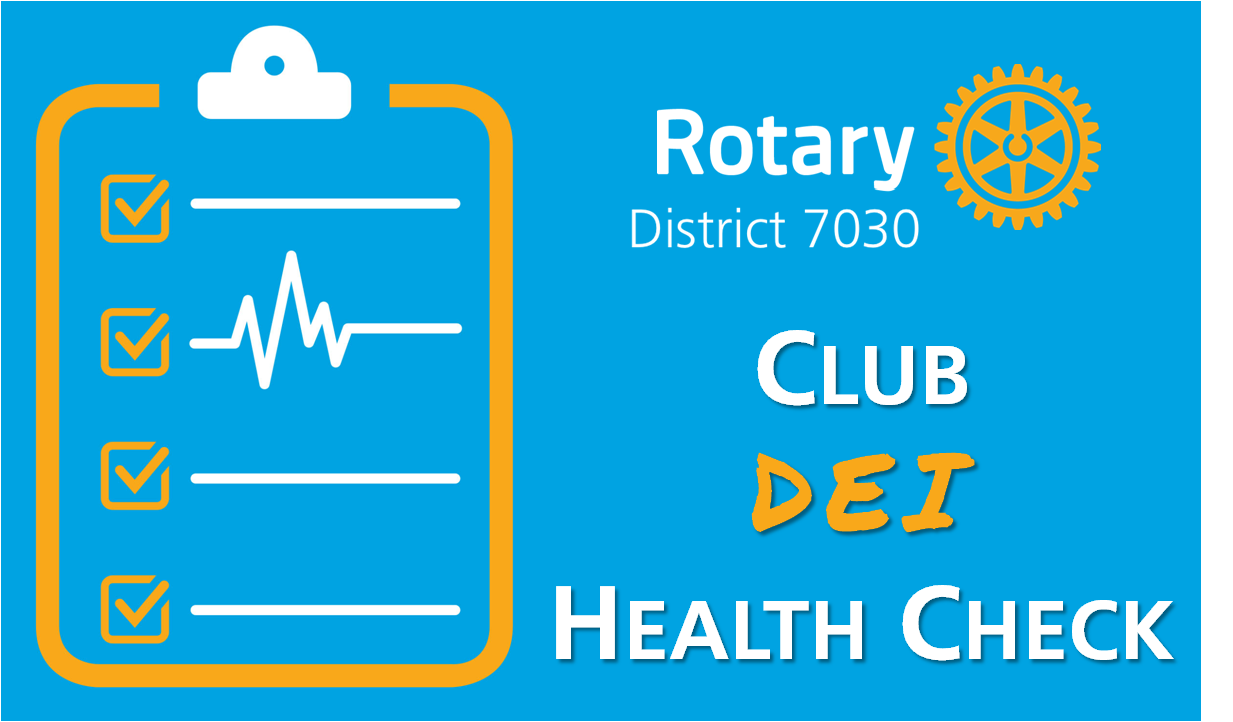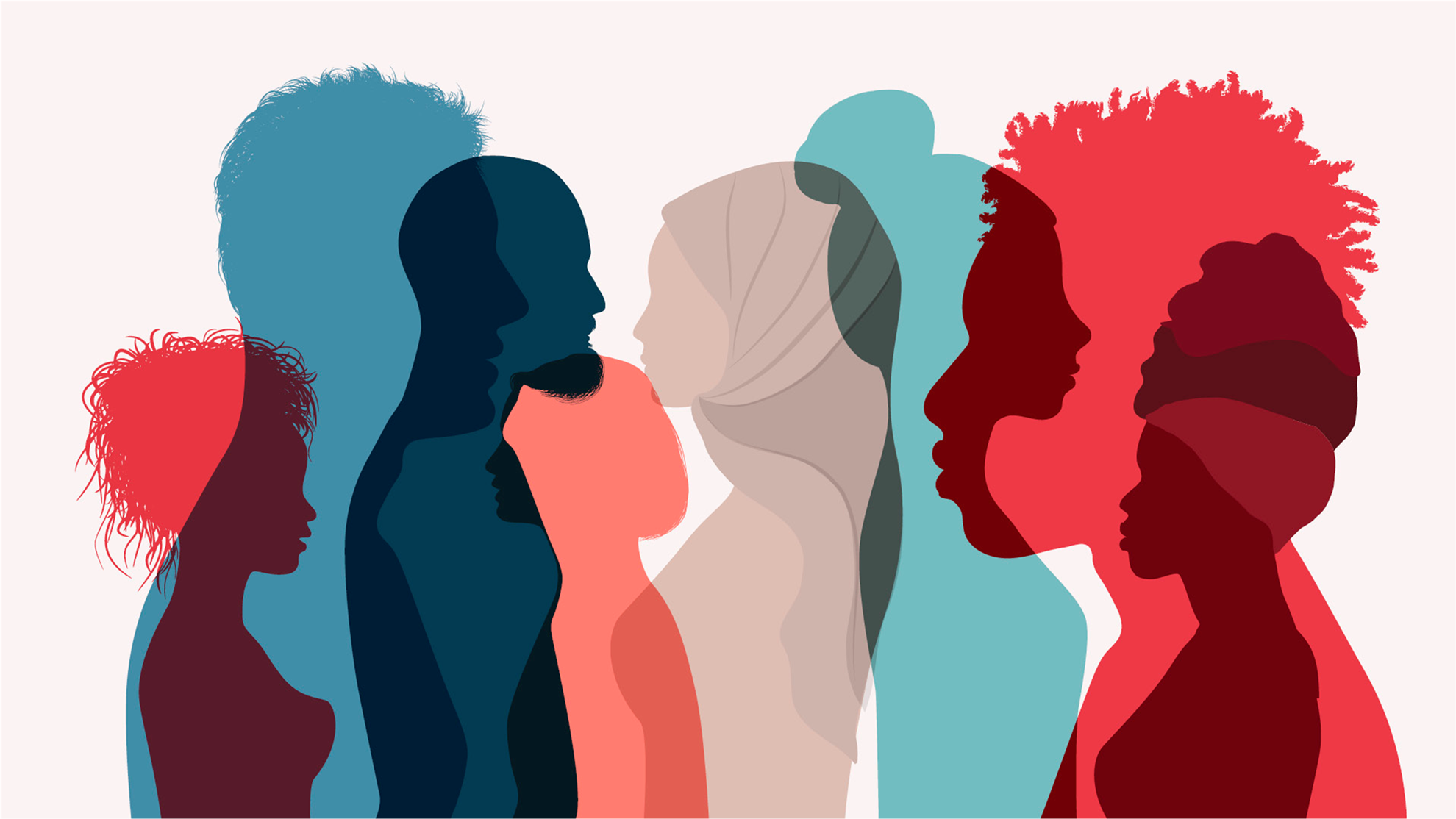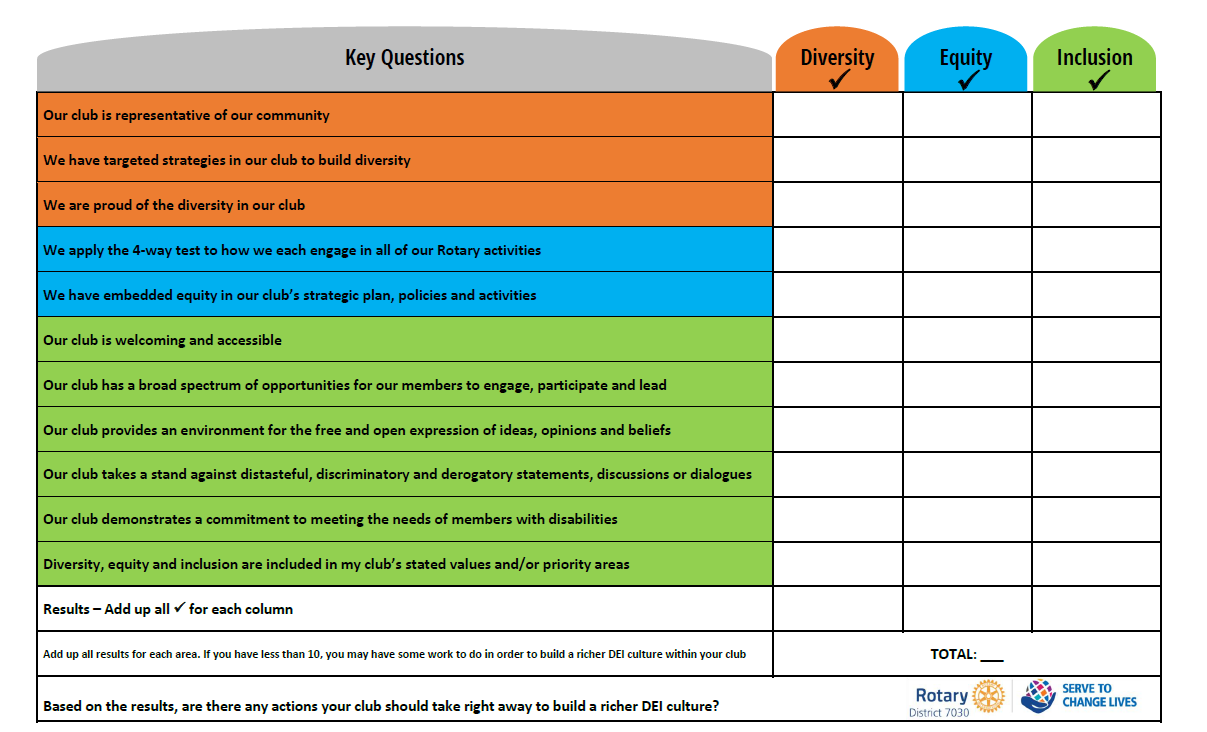
How well does each one of us, our clubs and club leadership encourage and celebrate diversity, equity and inclusion in practise?
Equity and diversity are recognized in our organizational legislation and, as of 2020, Rotary International has approved an official diversity, equity and inclusion policy.
Discussions on the importance of how members and clubs respond to this should be underway among club leaders and club boards. Concerns over members and clubs that have been making slow if any progress on ensuring a club is embracing the diversity, equity and inclusivity challenge should also be voiced and addressed in ongoing discussions. In many instances certain clubs seem to behave as though they are an exclusive within a community – not reflective of the demographic changes which are occurring or have already occurred in communities. Other clubs are also inconsistent in their welcoming and support of those from different backgrounds who wish to join Rotary in doing good in the world, particularly if they have a different perspective on what is needed and how to achieve it.
During his 2020-2021 term, Past Rotary International President, Holger Knaack said, “every country has its history. I do not believe in deleting history, but instead learning from it. I believe in that totally. Everything has to be put on the table so we can learn for our future.” and “For me, diversity is not a wish list for a Rotary club, this is part of our core values.”
People within the Caribbean like to think of ourselves as being truly multicultural. In Rotary we also consider ourselves to be open to all. That may be so in terms of the range of ethnicities, races and creeds in our communities, but have we truly integrated all persons into our communities and Rotary clubs? Do we understand the various backgrounds and experiences that others bring to our shores? Do our Rotary clubs appropriately reflect the wider demographic of our communities?
In Rotary, even among some clubs that have not had a problem with attracting new members over the last 10 years; retaining them is an issue, with a significant proportion of new members leaving within 2 years of joining. Part of that is due to clubs not meeting the expectations of new members – did a club over promise and not deliver or was it something more worrying?
New members have identified Rotary as something they want to be a part of to truly make a difference in our world. Importantly they bring new skills, new views, new energies to the fold and potentially they may also identify new opportunities (and ways) for Rotary to engage and support the needs of the community (both locally and internationally).
So here is the challenge we must all consider: Are we truly open to and accepting of other cultures. beliefs, values and ways of doing things in our clubs?
While the foundations of Rotary are largely unchanged over the past 116+ years, what we do and how we have delivered Rotary has changed significantly and must continue to do so.
When considering the strategic direction, priorities and plan for Rotary, looking to the future of our clubs is an important first step in ensuring each remains relevant and well positioned to be effective. Just as in business, keeping an eye to the future, evolving and adapting our practices are all essential to not only our success as clubs, but also, our survival. Club leaders need the support of members to openly and honestly discuss the issues and identify strategies to keep clubs engaging and vibrant, as well as, attract and retain new and current members. In some cases, it may take several years to identify and implement the changes needed, but the development of a plan is a critical first step and all members should actively support club leaders as they strive to address these challenges.
Make Your Club More Inclusive

Needless to say, on the diversity, equity and inclusion front, when clubs do actively seek to increase their diversity, members must make sure to welcome new additions openly and make their experience of Rotary as enjoyable as possible.
Disappointingly at times that has not been the case for several relatively new members in our clubs. At times, news members have had a very poor experience primarily due to a lack of consideration and openness by the existing membership – so much so that they felt the only option was to leave said club. It is this type of contentious environment which can actively or passively be at the heart of a club's lack of DEI values and where the members who promulgate it should have a good look in the mirror at the behaviors they displayed.
What we say, what we do, how we do it and how we hold ourselves individually and collectively accountable for our interactions with fellow Rotarians is important. Be respectful in asking new members about their background and learning more about them – but do not judge them – their life story may have many challenges that may be difficult for them to discuss with others until they are comfortable to do so. Encourage, but do not force, them to participate in all that is good in our Rotary world.
A simple act such as ensuring new members are asked to join different groups at your club meetings can make a world of difference to how quickly they feel truly welcome.
It is incumbent on us all to support all members and to especially make all new members feel welcome, support them all by sharing our professional, experiential and Rotary knowledge, and to demystify the morass of Rotary acronyms.
Concurrently, Rotary’s adopted diversity, equity and inclusion policy sends a strong message about embracing inclusivity. Rotary has clubs all over the world and reaches a broad range of people with our service projects. So, we are already diverse in a lot of ways, but a second ingredient, inclusion, is the key to unlocking and maintaining the full benefits of that diversity. How inclusive is your club?
Verna Myers, founder of the Verna Myers Company and Vice President of Inclusion Strategy at Netflix, has explained the difference between the two concepts as: “Diversity is being invited to the party, inclusion is being asked to dance”.
In the context of Rotary membership, this means that it is not enough to invite people from diverse backgrounds to our meetings and events. We need to include them in club planning and decision making, and value their contributions.
Make your club accessible
- Do you meet in a convenient location for everyone? If not, consider meeting in more than one venue or provide remote access options such as Zoom.
- Can people find information easily if they are unable to attend?
- Does the time of your meeting work for the demographic you are trying to attract? You could provide options, such as some morning and some evening meetings. Not every meeting needs to include a meal.
- Are there any unnecessary costs that block some from attending, such as the cost of a meal? A limited menu can also create unintentional barriers for those with dietary restrictions. Also consider providing the choice of not eating at all.
- Can you bill for fees on a monthly or quarterly basis instead of annually for those who would manage better this way? You could set up a small premium to cover the added cost.
Give all members something meaningful to do
Try not to make assumptions about what members would like to do and just hand over a task that has not been done by other members. For example, not every young person wants or knows how to manage the club’s social media accounts or website.
Finding something meaningful requires club leaders to understand why each member is in Rotary and determine what activities would fulfill their passion and purpose for joining. It is sometimes easier to do a task yourself then delegate, but handing tasks over to someone new is a great way to include them.
Provide diversity and inclusion training
Every club can benefit from an honest discussion about these topics. I have received feedback from many members and have heard in consulting with districts that some people hesitate to join (or stay) because of inappropriate comments or behaviour they have experienced. Bring in a speaker or conduct a training session on any of the following topics:
- Using inclusive language – Learn about the effects our words have on creating a culture of normalised behaviour. Gendered language, for instance, is a barrier toward achieving gender equality. To achieve the goal of having women comprise 30 per cent of membership and leadership by June 2023, we need to take positive action in this arena.
- Detecting and avoiding unconscious bias and discrimination – Sometimes people can unintentionally be treated unfairly because of a personal characteristic.
- Understanding and avoiding sexual harassment – The ‘Me Too’ movement has raised awareness of sexual harassment. Bring in an expert to raise your club’s awareness of the issue and what they can do to prevent it.
- Calling out inappropriate behavior as a bystander – David Morrison, retired Lieutenant General of the Australian Army and current chair of Diversity Council Australia, notes: “The standard you walk past is the standard you accept”.
- Participate – In International Women’s Day, Harmony Day, your local Pride celebrations and other days that celebrate diversity.
There are many strategies your club can employ. But for any to work, you must accept that change is vital to Rotary’s continued success. We can admire Rotary International for approving the diversity, equity, and inclusion policy; now, it is up to members to work it down to the club level. Learn what your club can do about diversity.
DEI Health Check
RI President-elect Jennifer Jones stated: “Diversity, equity and inclusion should begin at the top, and for us to welcome new leaders into our organization and expand our ability to make an impact, we need to build stronger bridges that help everyone see themselves reflected, celebrated and valued here in Rotary”
While 2021 was certainly a year to remember, in looking at 2022, there is a fresh opportunity to reflect, recharge and perhaps reset your club goals for both the new calendar year and upcoming new Rotary year – so it is timely for current and incoming club leaders to do a simple club health check with all members
As we turn our minds to the potential in the months ahead, members and clubs are encouraged to stop, pause and apply a DEI lens and perhaps think about conducting a DEI Health Check on your club.
What is a DEI Health Check you ask? It is a simple tool that you could use to guide a conversation about where your club might be with respect to DEI and some potential areas for improvement. The tool below could assist with starting that conversation.
click to view / download
This tool can be used annually as well as a check throughout the Rotary year to see what progress your club has made with respect to your DEI work. The key is to start the conversation!
If you need assistance with or would like to have a discussion about the DEI work you are doing in your club or community, please reach out to the District 7030 Membership Chair and or the District 7030 DEI Coordinator.
